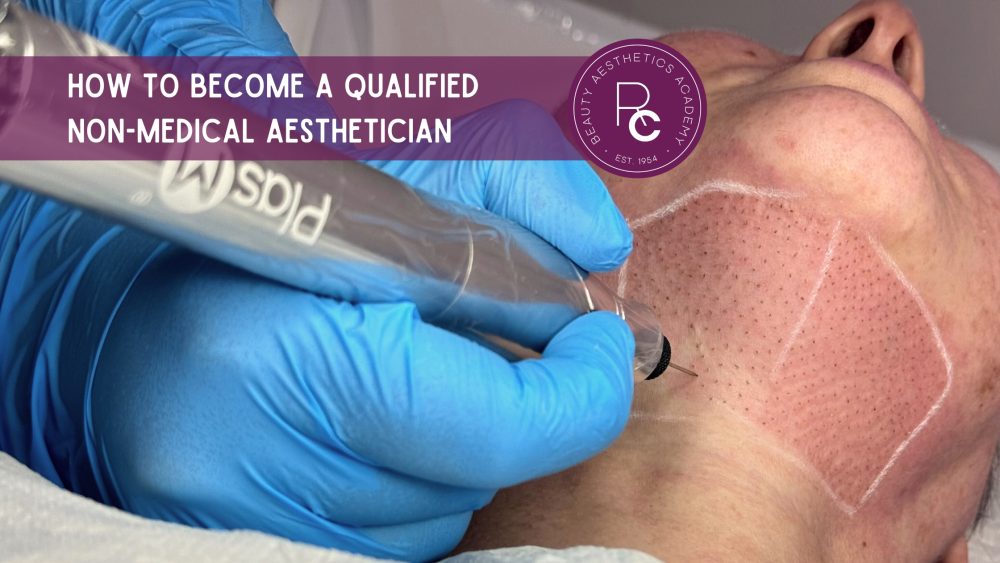
As aesthetic treatment grows more popular in the UK, this industry is now worth billions of pounds. As a result, there are more career prospects than ever for those looking to practice as a non-medical aesthetician. Whilst other industries felt the effects of COVID-19 financially, the aesthetics industry continued to grow. It could be down to people sitting in front of cameras all day or the shift of focus to self-care.
Whatever the reason, the aesthetics industry has proven over the last 2 years that it’s a market that is here to stay.
Are you confused about the difference between an Aesthetician and a Beauty therapist? Or a medical Aesthetician and a non-medical Aesthetician? We’ve got you covered with detailed information about a non-medical aesthetician and how to become a qualified one. It is important to note that throughout this blog, when we refer to an Aesthetician, we will be referring to a non-medical Aesthetician
Let’s begin!
What Does an Aesthetician Do?
An Aesthetician is a skincare professional specialising in non-medical, advanced skin treatments to enhance the appearance, health, and overall condition of a client’s skin. Often referred to as skin care specialists, aestheticians perform a range of treatments that go beyond basic beauty care, focusing on therapies designed to address specific skin concerns, such as acne, hyperpigmentation, ageing, and sun damage.
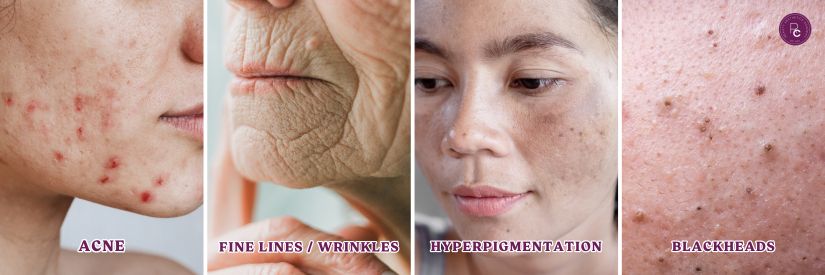
Much of an aesthetician’s work involves customising treatment plans for individual clients, focusing on results-driven therapies. They conduct in-depth skin analysis, recommend home care routines, and provide guidance on using professional skincare products. Aestheticians are pivotal in improving a client’s confidence through effective skincare treatments.
With the rise in demand for non-invasive cosmetic treatments, the role of an aesthetician has evolved. Clients are increasingly looking for alternatives to surgery that offer aesthetic enhancements with minimal downtime. Aestheticians are at the forefront of this trend, delivering procedures that balance cosmetic improvements with skin health, such as laser skin rejuvenation, chemical skin peels, microneedling, and plasma pens. This profession has grown significantly in recent years as more people seek both preventive and corrective skincare solutions.
Differences Between Beauty Therapists and Aestheticians
Beauty Therapists offer a wide range of beauty treatments, including facials, waxing, and massage, and typically work in more relaxed environments like salons or spas. Aestheticians, on the other hand, focus on more advanced, technical skincare treatments and work in clinical settings. Due to the advanced nature of their services, aestheticians undergo more specialised training and typically have a higher earning potential.
In the following table, we will compare the differences between a Beauty Therapist vs an Aesthetician, discussing how their job responsibilities differ, the qualifications needed to become either, comparing their salaries and career opportunities.
| Aspect | Beauty Therapist | Aesthetician |
| Primary focus | A wide range of beauty services offered, including skin, nails, hair removal, and massages. | Advanced skincare and non-invasive treatments like laser, chemical peels and microneedling. |
| Qualifications Required | Requires a VTCT Level 2 and Level 3 Beauty Therapy Diploma | Requires Level 2 Facial, Level 3 Facial Electrotherapy and a Level 4 qualification in advanced aesthetic treatments. |
| Treatments Offered | Waxing, manicures, pedicures, facials, massages, lash and brow treatments. | Laser/IPL, microneedling, chemical peels, skin resurfaction, mesotherapy, plasma pen and tattoo removal. |
| Career Path | Can work in salons, spas and as a freelance Beauty Therapist. | Typically works in clinics or medical spas that specialise in more advanced skin procedures. |
| Training Duration | Around 24 weeks to complete their Level 2 and Level 3 Beauty Therapy Diploma. | Between 14-26, depending on previous experience and advanced courses completed. |
| Job Demand | Beauty Therapists are in high demand and have been for many years with versatile career options. | Aestheticians are growing in demand as clients look for non-invasive skincare treatments driven by trends in skin health. Specialist Aestheticians are becoming increasingly sought out. |
| Salary | Can start at £24,000 with the potential to earn more with experience and advanced training. | Higher starting salary, especially with Level 4 qualifications often exceeding £30,000+ |
Difference Between Medical and Non-Medical Aesthetician Roles
10 years ago, there would have been a considerable difference in the treatments a medical vs non-medical Aesthetician would have offered. Now? Not so much.
| Medical aesthetician | Non-medical aesthetician |
| A medical esthetician will have trained academically to work as a Doctor or Nurse. The training would give them an in-depth knowledge of the human body, skin, nerves and muscles. | More complex and life-changing skin concerns, such as skin trauma and plastic surgery recovery treatments, do not account for the most popular aesthetic treatments, which a non-medical aesthetician is trained and qualified to complete. |
| A medical aesthetician can work on more complex and life-changing skin concerns, such as skin trauma and plastic surgery recovery. | However, those in the UK looking to start a Level 4 aesthetics course; must learn about Anatomy & Physiology, which ensures they have a thorough understanding of the human body. |
Benefits of Becoming an Aesthetician
The aesthetics industry is growing faster than any other element of beauty (nails, hair and massage therapy). Studies have attributed this growth to an increased interest in health and self-care.
Many younger customers focus on preventing signs of ageing earlier, some starting as early as in their teens! Clients are also becoming more aware of advanced aesthetic treatments through social media marketing and looking to get them done near them. Simply, people want to look and feel their best and are willing to pay more.
Beginner Non-medical Aestheticians working in a salon environment can earn up to £30,000 a year. This figure will increase the more your portfolio grows and the more reputable you become.
There has never been a better time to study the face and skin to become an aesthetician.
Let us know the step by step process to become a non-medical aesthetician.
Essential Skills for Aspiring Aestheticians
Take a look at the skills which you need to have to become an aesthetician:
Skincare Expertise:
Proficiency in analyzing skin types and conditions, performing facials, extractions, and recommending appropriate treatments and products.
Communication:
Effective communication to understand and address clients’ needs, explain procedures, and provide skincare advice.
Hygiene and Sanitation:
Strict adherence to hygiene and sanitation practices to ensure a safe and clean environment for clients.
Product Knowledge:
In-depth knowledge of skincare products, ingredients, and their benefits for different skin types.
Customer Service:
Exceptional customer service skills to build relationships, provide a positive client experience, and address concerns.
Problem-Solving:
The ability to assess skin issues and develop treatment plans to address specific concerns.
Time Management:
Efficient time management to accommodate appointments, treatments, and client consultations
How to Become a Qualified Aesthetician (Non-Medical) in the UK
Here at Ray Cochrane Beauty Aesthetics Academy, we have a tried and tested step-by-step guide consisting of just four steps for those aspiring to become a qualified aesthetician.
Step 1: Find the right accredited courses to become a qualified aesthetician
Step 2: Choose a reputable aesthetic academy to complete your training
Step 3: Practice your skills and gain experience
Step 4: Keep learning
Through our guide, we’ve worked out a journey plan that will allow you to reach your goal as quickly as possible. We’re talking about being fully qualified in just 6 months!
Step 1: Find the right accredited courses to become a qualified aesthetician
For those looking to become a recognised non-medical aesthetics practitioner, you must have relevant Level 2 and Level 3 and Advanced Level 4 Beauty qualifications. Level 2 covers the basics of facial and skincare, whilst Level 3 advances the learner’s knowledge and fully qualifies them to become a facialist. However, an accredited Level 4 qualification sets learners apart and allows them to practice as non-medical aestheticians.
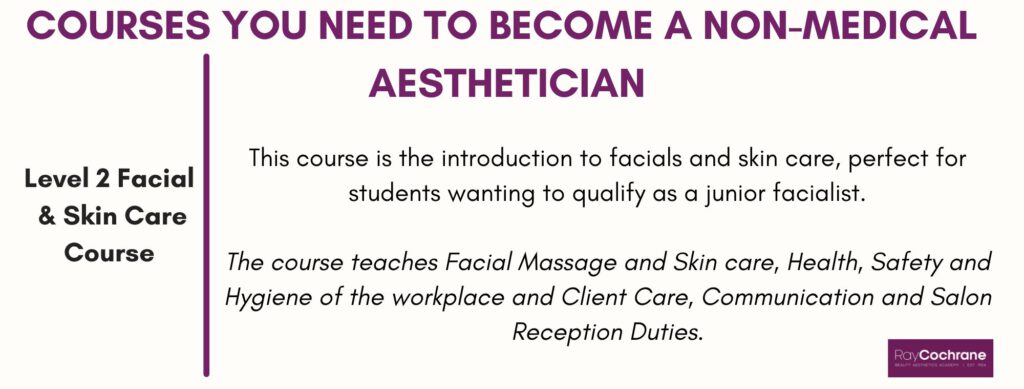
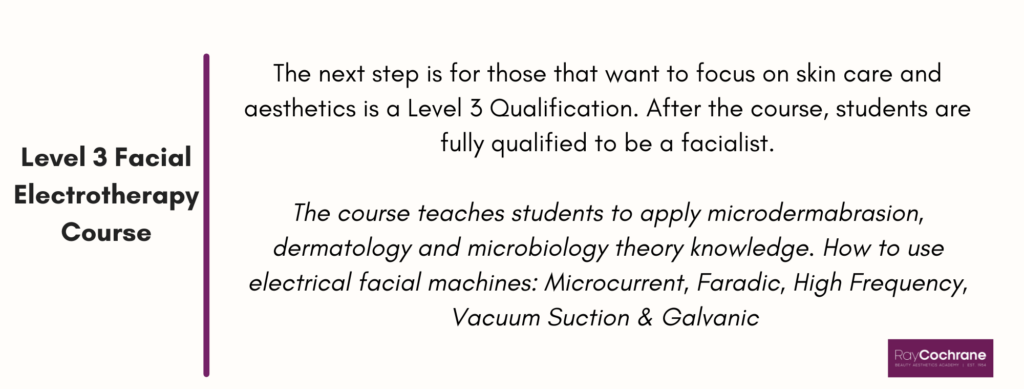
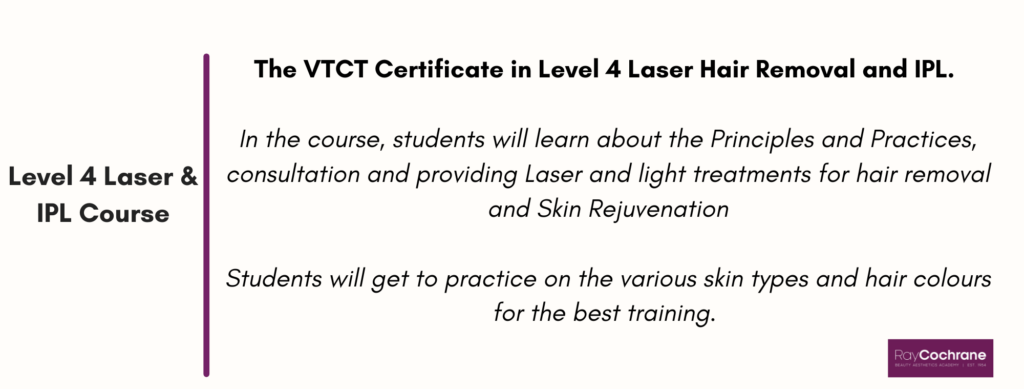
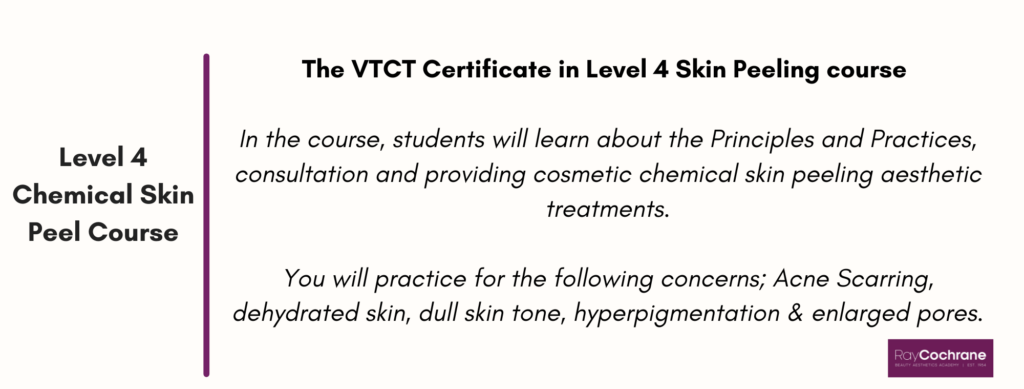
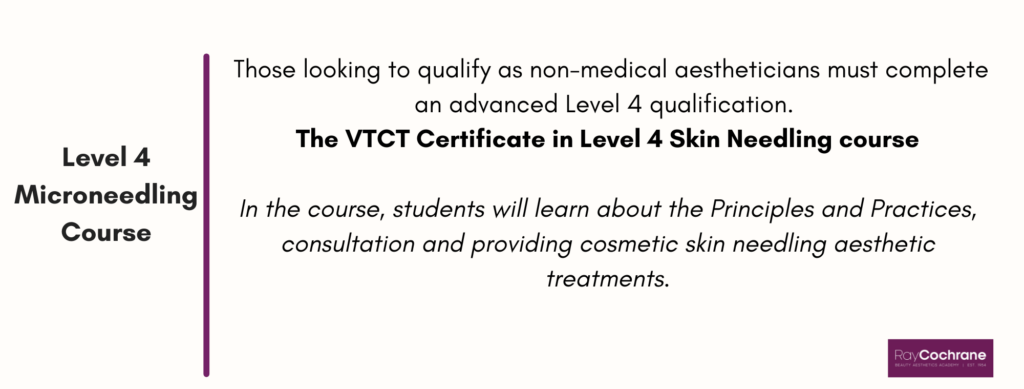
Level 2 Facial and Skin Care course:
The first course to becoming a non-medical aesthetician is to learn the basics, the foundation of future knowledge. The VTCT Level 2 Facial and Skin Care course offers exactly that. Previously students would have had to learn everything about beauty – nails, brows, waxing, and massages – before progressing on to their aesthetics careers. However, as the years passed, we at Ray Cochrane found that students wanted to focus on skincare.
A Level 2 Facial and Skin Care course introduces learners to the theory of the skin, skin analysis, and Anatomy and Physiology. After those bases are covered, students will study facial and skin care treatments. Health and safety, salon management, and client communication are on the curriculum to ensure students can successfully oversee a salon.
At this stage, students are qualified to practice as junior facialists or can move on to the next course on their journey to becoming an aesthetician.
The Level 3 Facial Electrotherapy course:
If you still need a level 2 qualification, you must do so before joining our Level 3.
Our Level 3 Qualification develops students’ skills in providing facials using electrical equipment to improve the appearance of the face and neck.
This unit will shape your theoretical understanding of the skin and how particular skin concerns come to exist. In addition, the theoretical knowledge will assist you in the future with client consultation and treatment plans.
The training provided will also prepare students to work in the aesthetics industry with facial electrical equipment. Students on the course will learn to work with various facial electricals to offer the following facials:
Microcurrent facials work by stimulating the facial muscles using low-voltage electricity. Faradic facials similarly exercise the facial muscles by quickly sending currents on and off to encourage contractions. Vacuum Suction Facials in which a light suction works the skin’s surface, from the neck upwards, to lift the underlying lymphatic vessels.
Learners may only use some of the various machines in the future, but the experience will help them adapt to other facial electricals. These devices form the basis of machines used by CACI, Gunoit and many more reputable salon brands.
Level 4 Certificate in Laser Hair Removal & Skin Rejuvenation, Chemical Peels, Fibroblast and Microneedling
To become a qualified and insurable Aesthetician, you need an advanced Level 4 Qualification. At Ray Cochrane, we have a range of advanced aesthetics qualifications taught to meet the industry standard and client demands. The Level 4 Chemical Skin Peel, Level 4 Microneedling, Level 4 Fibroblast Plasma Pen or Level 4 Laser & IPL.
To enrol on any of our level 4 courses, students MUST have completed their levels 2 and 3. If you already have medical training, nurses or doctors, you can start on a level 4 course immediately. The anatomy and physiology learned in Levels 2 and 3 will be revised and expanded to accommodate level 4 practices. Once students have grasped these, they will move on to practical training.
In our Level 4 courses, students learn all the safety issues relevant to their chosen treatments. Learning how to correctly and safely deliver these advanced treatments is very important. Students will be dealing with lasers, chemicals, or needles, depending on the treatment. As an aesthetician, practitioners have a duty to their clients to treat them as safely and correctly as possible.
Across our level 4 courses, learners will master client consultation skills which will aid them in perfectly performing these advanced treatments. After all, client consultations help aestheticians better understand their clients’ skin and explain the treatments and possible reactions.
Studying a Level 4 Qualification in a professional establishment is vital to becoming a non-medical aesthetician. Learners need to understand how the treatment targets various skin concerns and which treatment works best for the desired results. Students will also get to practice these treatments on fellow students and models to ensure they are doing it correctly.
Once learners have completed their Level 4 Training and examination, they are officially fully qualified non-medical aestheticians. Ready to go out into the world and bless their clients with healthy skin.
Level 5 Skin Peels & Laser Tattoo Removal
You don’t have to stop after completing a Level 4 qualification! We are pleased to have introduced new Level 5 qualifications for those working as an aesthetician in the UK.
Firstly, we have the VTCT Level 5 Chemical Peel Course for those who have completed their Level 4 Chemical Peel qualification and wish to further enhance their expertise. Our course is designed to deepen students’ understanding of chemical peels, introducing stronger acids and advanced application techniques to treat more severe skin concerns.
At Ray Cochrane, we ensure that all students gain hands-on experience with high-strength peels, learning how to assess a client’s skin type, select the appropriate peel solution, and manage any potential risks or complications.
If you want to expand your laser treatment skills, the Level 5 Laser Tattoo Removal course is the perfect next step. This advanced aesthetic course provides in-depth training on the science behind laser tattoo removal, covering topics such as laser physics, different tattoo pigments, skin types, and how to safely and effectively remove unwanted tattoos.
With hands-on practice on real clients, students will learn to assess clients for suitability, understand the risks and benefits and perform safe laser tattoo removal using advanced techniques.
Completing a Level 5 qualification enhances your skill set and boosts your credibility as a highly trained aesthetic practitioner. Whether you specialise in advanced skin peels or laser tattoo removal, our expert tutors will equip you with the knowledge and practical experience needed to thrive in aesthetics.
Level 6 Mesotherapy Training
For experienced aestheticians looking to advance their skills to the highest level, the VTCT Level 6 Award in Mesotherapy offers expert aesthetic training in needle and no-needle mesotherapy for skin rejuvenation, hydration, and hair restoration.
This course covers advanced mesotherapy techniques, ingredient selection, and client assessment, ensuring safe and effective treatments. Students will learn to deliver targeted micro-injections, identify contraindications, and tailor treatments for various skin concerns. Practical, hands-on training with real clients builds confidence and precision.
Whether aiming to work in top clinics or expand treatment offerings, this course provides invaluable expertise, equipping learners with the skills and knowledge to excel in advanced aesthetics and deliver exceptional results.
A Level 6 qualification enhances credibility, setting practitioners apart in the highly competitive industry.
Step 2: Choose a reputable aesthetic academy to complete your training
Choosing the right beauty school is the most crucial step, as it will impact your journey to becoming a qualified non-medical aesthetician. The aesthetic training centre you choose to attend will determine so much. When choosing a beauty aesthetic academy, you should look for one that offers in-depth training and experienced tutors with hands-on experience.
Step 3: Practice your skills and gain experience
Once you have completed your courses and gained your qualification, you can safely administer your treatments to clients. However, this does not make you an expert. Expertise in any field comes from practice, practice and more practice.
We always suggest students seek out employment immediately after finishing their course. It doesn’t have to be your dream clinic immediately, but you want to start practising on a variety of clients to build your portfolio. The more experience you get, the more likely you will progress faster and get better jobs.
At Ray Cochrane, we often host career days and open events where beauty and aesthetic businesses will come to the school to meet our students with the goal of future employment. We also have an exclusive job board in which our students get access to the latest job listings in the industry. As an advanced aesthetics training provider, we understand our student’s primary goal is to gain employment as qualified non-medical aestheticians.
Step 4: Keep learning
You will need to keep learning even when you are qualified and experienced. This is because the aesthetic industry and its many treatments are constantly evolving. Machines and products get better and more advanced to reflect the growth in beauty science. For example, in the last ten years, the devices used to achieve Laser and IPL treatments have progressed so much to include more skin and hair colours.
As a non-medical aesthetician, you will need to keep up with the latest treatments, products and machines, so you’ll probably have to complete Continuing Professional Development (CPD) courses as you get more confident. In addition, CPD courses are a great way to learn new treatments you are interested in without spending weeks/months on a course. For example, we currently offer an intensive 1-day CPD accredited Mesotherapy course at Ray Cochrane. Learners can only complete it so quickly due to their previous beauty/aesthetic training and experience.
Aside from completing further qualifications, you can visit famous beauty and aesthetic exhibitions around the country. These exhibitions are great for aestheticians to network with like-minded professionals and learn more about popular brands, products and treatments. We highly recommend these to our students and graduates, especially those looking to start their own clinics and salons. Exhibitions are very useful for beauty and aesthetic businesses to connect with potential vendors.
No matter your industry, you will always need to work on yourself and improve your abilities. The aesthetic industry is no different, so we tell all our students and graduates that the final step to becoming a successful non-medical aesthetician is to keep learning!
Why Choose Ray Cochrane for Non-medical Aesthetician Training in the UK?
As one of the best aesthetics academies in the UK, students come from around the country to study with us. As a result, we have trained many non-medical aestheticians who are now successfully running their own clinics.
Ray Cochrane Beauty Aesthetics academy opened in 1954, the first beauty academy in the UK to offer the prestigious CIDESCO qualification. Since then, we have strived to keep in front of the beauty and aesthetic industry’s demands on aspiring therapists to provide the most current and in-demand courses.
Our courses take students from the foundation and work them carefully to more complicated topics. This method ensures that students understand every course element and stay caught up, increasing their pass rate.
Behind the in-depth course structures are Ray Cochrane’s expert aesthetics tutors, who have worked hard using their experience and extensive aesthetic knowledge to develop the courses. All with over ten years of experience within the beauty and aesthetics industry, they are the best of the best. So naturally, having good tutors will make completing such advanced qualifications easier.
Become a Qualified Aesthetician with Ray Cochrane
If you would like to further discuss your journey to becoming an non – medical aesthetician.
You can call us on 020 7486 6291; our office is open Monday – Friday, 9 am to 5 pm. Otherwise, you can use the contact form on the right side of the page, leave your details, and a member of our course enrollment advisors team will be in touch.
Another option is to use the live chat feature on our website, though please remember this option is only available during our open hours. Alternatively, you can book a course consultation call at your convenience by clicking here
Finally, you may prefer to contact us via email, in which we ask you to send your emails to admission@original-ray-cochrane.local with the subject line ‘non-medical Aesthetician course’.
As always, feel free to reach out and ask any questions. There is never any pressure to enrol in the courses; we want to advise those looking to enter the aesthetic industry as honestly as possible.
View this post on Instagram
FAQs on How to Become an Aesthetician
1. What is a non-medical aesthetic practitioner?
A non-medical aesthetic practitioner is a trained professional who offers cosmetic treatments to enhance skin appearance, focusing on beauty and non-surgical procedures.
2. What are the common skin concerns that a non-medical aesthetician can treat?
Common skin concerns treated by non-medical aestheticians include uneven tone, hyperpigmentation, acne, signs of aging, and more.
3. Do you have to be qualified to do aesthetics?
Yes, qualifications are essential for aesthetics, ensuring proper training and expertise in providing safe and effective treatments.
4. What steps are involved in becoming a qualified non-medical aesthetician?
Becoming a non-medical aesthetician involves finding accredited courses, choosing a reputable training academy, gaining practical experience, and continually learning about evolving treatments. We at Ray Cochrane Beauty Aesthetics Academy provide accredited non medical aesthetician courses.
5. What courses should I take to become a non-medical aesthetician?
Start with a Level 2 Facial & Skin Care course, followed by the Level 3 Facial Electrotherapy course. To specialize further, consider Level 4 courses in Laser & IPL, Chemical Peels, or Microneedling. For more details on non medical aesthetician course contact Ray Cochrane Beauty Aesthetics Academy

